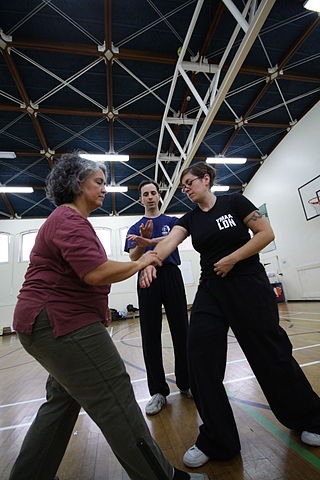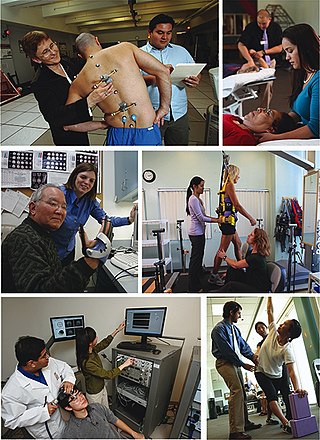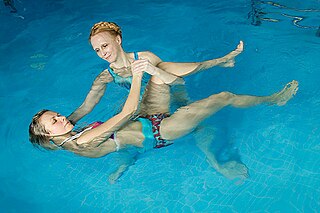Related Research Articles

Training is teaching, or developing in oneself or others, any skills and knowledge or fitness that relate to specific useful competencies. Training has specific goals of improving one's capability, capacity, productivity and performance. It forms the core of apprenticeships and provides the backbone of content at institutes of technology. In addition to the basic training required for a trade, occupation or profession, training may continue beyond initial competence to maintain, upgrade and update skills throughout working life. People within some professions and occupations may refer to this sort of training as professional development. Training also refers to the development of physical fitness related to a specific competence, such as sport, martial arts, military applications and some other occupations.

Calisthenics or callisthenics is a form of strength training that utilizes an individual's body weight as resistance to perform multi-joint, compound movements with little or no equipment.

Exercise is physical activity that enhances or maintains fitness and overall health. It is performed for various reasons, including weight loss or maintenance, to aid growth and improve strength, develop muscles and the cardiovascular system, hone athletic skills, improve health, or simply for enjoyment. Many individuals choose to exercise outdoors where they can congregate in groups, socialize, and improve well-being as well as mental health.

Physical fitness is a state of health and well-being and, more specifically, the ability to perform aspects of sports, occupations, and daily activities. Physical fitness is generally achieved through proper nutrition, moderate-vigorous physical exercise, and sufficient rest along with a formal recovery plan.

Pushing hands, Push hands or tuishou is a two-person training routine practiced in internal Chinese martial arts such as baguazhang, xingyiquan, tai chi, and yiquan. It is also played as an international sport akin to judo, sumo and wrestling, such as in Taiwan, where the biannual Tai Chi World Cup is held.

Pilates is a type of mind-body exercise developed in the early 20th century by German physical trainer Joseph Pilates, after whom it was named. Pilates called his method "Contrology". It is practiced worldwide, especially in developed countries such as Australia, Canada, Germany, South Korea, New Zealand, the United Arab Emirates, the United Kingdom, and the United States. Pilates uses a combination of around 50 repetitive exercises to spur muscle exertion. Each exercise flows from the "five essentials": breath, cervical alignment, rib and scapular stabilization, pelvic mobility, and utilization of the transversus abdominis. Each exercise is typically repeated three to five times. As of 2023, over 12 million people practice Pilates.

Kinesiology is the scientific study of human body movement. Kinesiology addresses physiological, anatomical, biomechanical, pathological, neuropsychological principles and mechanisms of movement. Applications of kinesiology to human health include biomechanics and orthopedics; strength and conditioning; sport psychology; motor control; skill acquisition and motor learning; methods of rehabilitation, such as physical and occupational therapy; and sport and exercise physiology. Studies of human and animal motion include measures from motion tracking systems, electrophysiology of muscle and brain activity, various methods for monitoring physiological function, and other behavioral and cognitive research techniques.

Sports science is a discipline that studies how the healthy human body works during exercise, and how sports and physical activity promote health and performance from cellular to whole body perspectives. The study of sports science traditionally incorporates areas of physiology, psychology, anatomy, biomechanics, biochemistry, and kinesiology.

Strength training, also known as weight training or resistance training, involves the performance of physical exercises that are designed to improve strength and endurance. It is often associated with the lifting of weights. It can also incorporate a variety of training techniques such as bodyweight exercises, isometrics, and plyometrics.

Eugen Sandow was a German bodybuilder and showman from Prussia, using the Bulgarian last name Sandow as a pseudonym. Born in Königsberg, Sandow became interested in bodybuilding at the age of ten during a visit to Italy.

An isometric exercise is an exercise involving the static contraction of a muscle without any visible movement in the angle of the joint. The term "isometric" combines the Greek words isos (equal) and -metria (measuring), meaning that in these exercises the length of the muscle and the angle of the joint do not change, though contraction strength may be varied. This is in contrast to isotonic contractions, in which the contraction strength does not change, though the muscle length and joint angle do.
Periodization is a cyclical method of planning and managing athletic or physical training and involves progressive cycling of various aspects of a training program during a specific period. Conditioning programs can use periodization to break up the training program into the off-season, preseason, inseason, and the postseason. Periodization divides the year round condition program into phases of training which focus on different goals.
Superhuman strength is a superpower commonly invoked in fiction and other literary works, such as mythology. A fictionalized representation of the phenomenon of hysterical strength, it is the power to exert force and lift weights beyond what is physically possible for an ordinary human being. Alternate terms of superhuman strength have included enhanced strength, super-strength and increased strength. Superhuman strength is an amorphous ability, varying in potency depending on the writer or the context of the story in which it is depicted.

A pull-up is an upper-body strength exercise. The pull-up is a closed-chain movement where the body is suspended by the hands, gripping a bar or other implement at a distance typically wider than shoulder-width, and pulled up. As this happens, the elbows flex and the shoulders adduct and extend to bring the elbows to the torso.

In sports science theory, supercompensation refers to the post-training period during which the trained parameter has a higher performance capacity than it did prior to the training period.

Dance is a healthy physical activity, with many far reaching physical, and psychological benefits. Dancing can be enjoyed in many forms, and is for every age and ability. This physical activity appeals to some who may not typically be active, and therefore may be another alternative of exercise. Dance for health has become an important factor in the prevention, treatment, and management in several health circumstances. It can benefit both physical and mental health and subsidizes social communication Dance is an art which is learned in and shared between many cultures. Types of dance can entail body movements, expression and collaboration. The correlation between dance and health has been subject of a number of research studies that show dance to be a largely healthy exercise. However, there are a number of health risks that require attention.
"The Great C" is a science fiction short story by American writer Philip K. Dick, first published in Cosmos Science Fiction and Fantasy Magazine in 1953. It has since been republished several times in collections such as Beyond Lies the Wub in 1988. Parts of the work, along with Planet for Transients, were later used in the full-length novel Deus Irae. The story is set in a post-apocalyptic world in which a young man is sent from his tribe every year to visit a godlike computer capable of mass destruction and try to stump it with three questions. The story was adapted into an animated virtual reality film in 2018 by Secret Location.
A strength and conditioning coach is a physical performance professional who uses exercise prescription to improve the performance of competitive athletes or athletic teams. This is achieved through the combination of strength training, aerobic conditioning, and other methods.
Football strength is a training regime, considered the most complex physical quality to be developed by an athlete. The training regime, exercises used, how the exercises are performed, and the types of equipment all play important roles in achieving desired results.

Watsu is a form of aquatic bodywork used for deep relaxation and passive aquatic therapy. Watsu is characterized by one-on-one sessions in which a practitioner or therapist gently cradles, moves, stretches, and massages a receiver in chest-deep warm water.
References
- ↑ "Answers - The Most Trusted Place for Answering Life's Questions". Answers.com. Archived from the original on 10 July 2018. Retrieved 10 July 2018.
- ↑ "Strength Training". Coachsci.sdsu.edu. Retrieved 10 July 2018.